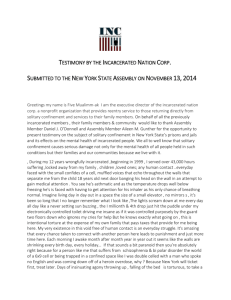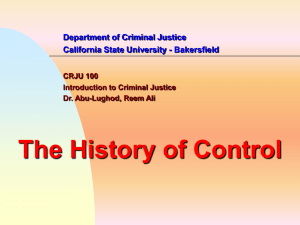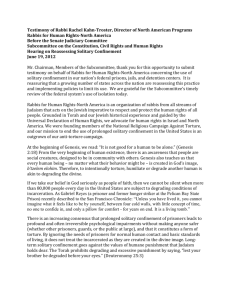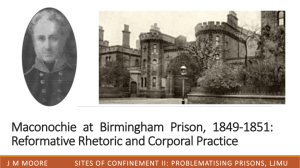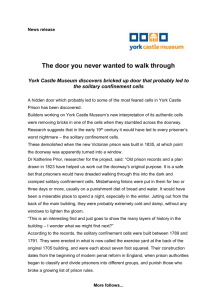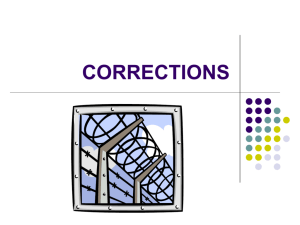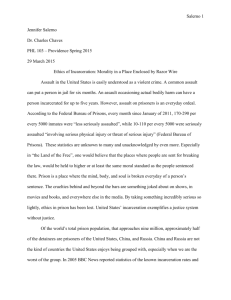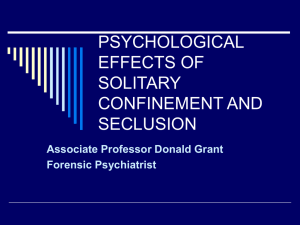Lawmakers, Advocates, and Survivors of Solitary Confinement Back
advertisement
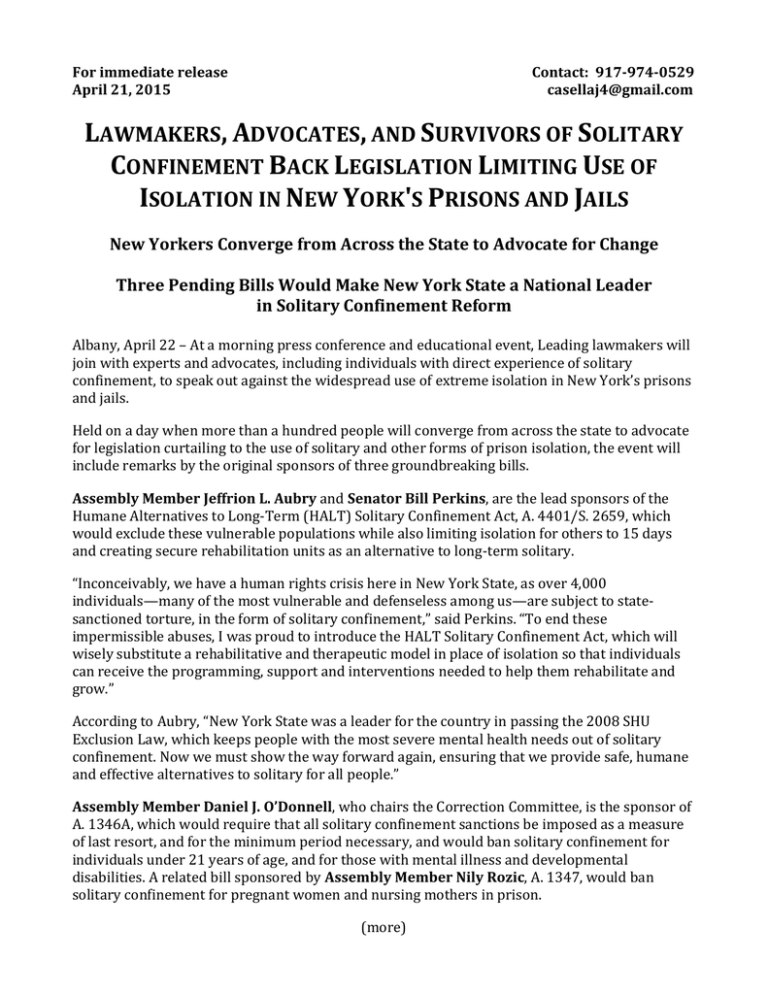
For immediate release April 21, 2015 Contact: 917-974-0529 casellaj4@gmail.com LAWMAKERS, ADVOCATES, AND SURVIVORS OF SOLITARY CONFINEMENT BACK LEGISLATION LIMITING USE OF ISOLATION IN NEW YORK'S PRISONS AND JAILS New Yorkers Converge from Across the State to Advocate for Change Three Pending Bills Would Make New York State a National Leader in Solitary Confinement Reform Albany, April 22 – At a morning press conference and educational event, Leading lawmakers will join with experts and advocates, including individuals with direct experience of solitary confinement, to speak out against the widespread use of extreme isolation in New York’s prisons and jails. Held on a day when more than a hundred people will converge from across the state to advocate for legislation curtailing to the use of solitary and other forms of prison isolation, the event will include remarks by the original sponsors of three groundbreaking bills. Assembly Member Jeffrion L. Aubry and Senator Bill Perkins, are the lead sponsors of the Humane Alternatives to Long-Term (HALT) Solitary Confinement Act, A. 4401/S. 2659, which would exclude these vulnerable populations while also limiting isolation for others to 15 days and creating secure rehabilitation units as an alternative to long-term solitary. “Inconceivably, we have a human rights crisis here in New York State, as over 4,000 individuals—many of the most vulnerable and defenseless among us—are subject to statesanctioned torture, in the form of solitary confinement,” said Perkins. “To end these impermissible abuses, I was proud to introduce the HALT Solitary Confinement Act, which will wisely substitute a rehabilitative and therapeutic model in place of isolation so that individuals can receive the programming, support and interventions needed to help them rehabilitate and grow.” According to Aubry, “New York State was a leader for the country in passing the 2008 SHU Exclusion Law, which keeps people with the most severe mental health needs out of solitary confinement. Now we must show the way forward again, ensuring that we provide safe, humane and effective alternatives to solitary for all people.” Assembly Member Daniel J. O’Donnell, who chairs the Correction Committee, is the sponsor of A. 1346A, which would require that all solitary confinement sanctions be imposed as a measure of last resort, and for the minimum period necessary, and would ban solitary confinement for individuals under 21 years of age, and for those with mental illness and developmental disabilities. A related bill sponsored by Assembly Member Nily Rozic, A. 1347, would ban solitary confinement for pregnant women and nursing mothers in prison. (more) “Following the United Nation’s Committee Against Torture’s report, it is all the more clear that we need to change the way we use solitary confinement in New York State,” O Donnell said. “Our prisons should be places of rehabilitation, not counterproductive punishment. The bills being advocated for today will contribute to that goal by making solitary confinement a true measure of last resort and banning its use for particularly vulnerable inmates who are under 21, pregnant, or mentally ill.” An Issue Whose Time Has Come Also featured at the event will be a special videotaped statement by the United Nations Special Rapporteur on Torture, Juan E. Méndez, a vocal critic of the use of solitary confinement in U.S. prisons. Méndez’s recommendations on the use of isolation—including the exclusion of vulnerable groups, and the 15-day limit for others—form the core of all three bills. Méndez’s attention to the issue of solitary confinement is part of a perfect storm of grassroots activism, litigation, and media attention that have placed solitary on public policy agendas across the country after years of being neglected or ignored. In New York’s state prisons, about 4,500 people are in some form of isolated confinement on any given day. They are held for 23 to 24 hours in cells smaller than the average parking space, alone or with one other person. Close to 800 are in solitary confinement in New York City jails, along with hundreds more in local jails across the state. New York isolates imprisoned people at levels above the national average, and uses solitary to punish minor disciplinary violations. A 2012 study found that five out of six sentences that result in placement in New York State's SHUs are for non-violent conduct. Individuals are sent to the SHU on the word of prison staff, and may remain there for months, years, or even decades. "Isolation does not promote positive change in people; it only damages them," said Megan Crowe-Rothstein of the Urban Justice Center's Mental Health Project. “Corrections needs to emphasize rehabilitation over punishment and degradation.” Crowe-Rothstein is among the organizers of the April 22 Advocacy Day for the HALT Act, which will draw some 120 people from across New York to meet with more than 60 legislators. HALT currently has XX sponsors in the Assembly and Senate. Most of those converging to lobby in the capitol are members of the New York Campaign for Alternatives to Isolated Confinement (CAIC), which was instrumental to the drafting of the bill. CAIC unites advocates, concerned community members, lawyers, and individuals in the human rights, health, and faith communities throughout New York State with formerly incarcerated people and family members of currently incarcerated people. "CAIC recognizes that we need a fundamental transformation of how our public institutions address people’s needs and behaviors, both in our prisons and in our communities," said Scott Paltrowitz of the Correctional Association of New York, who will also speak at the event. “Rather than inhumane and ineffective punishment, deprivation, and isolation, the HALT Act would provide people with greater support, programs, and treatment to help them thrive, and in turn make our prisons and our communities safer.” (more) 2 Rev. Ron Stief of the National Religious Campaign Against Torture said, “The diverse faith traditions represented by NRCAT share a belief in the dignity of each human person. As religious leaders, we are morally compelled to work for an end to isolated confinement in New York prisons and jails, a practice that the science of the mind and the ethics of our traditions condemn as torture. This legislation provides New York with a critical opportunity to lead the way nationally in the growing movement to end this torture.” The Torturous Effects of Solitary The widespread use of long-term solitary confinement has come under fire in the face of increasing evidence that sensory deprivation, lack of normal human interaction, and extreme idleness can lead to severe psychological damage. Isolated confinement also fails to address the underlying causes of problematic behavior, and often exacerbates that behavior as people deteriorate psychologically, physically, and socially. Solitary confinement has never been shown to reduce prison violence. In fact, several state prisons systems, including Maine, Mississippi, and Colorado, have significantly reduced the number of people they hold in solitary confinement, and have seen prison violence decrease as well. In addition, individuals released from solitary confinement have higher recidivism rates. In New York each year, nearly 2,000 people are released directly from extreme isolation to the streets. Also speaking at the event will be remarks by Dr. Bandy Lee, Forensic and Correctional Psychiatrist at Yale University, who co-authored a sharply critical 2013 report on the effects of solitary confinement on people held in New York City jails. Like many of activists involved in the movement to end solitary confinement, two speakers at the morning event have been directly affected by solitary. Tyrrell Muhammad spent XX years in isolation in New York prisons, and is now an activist with the New York Campaign Against Isolated Confinement. Alicia Barraza is the mother of Benjamin Van Zandt, who entered prison at 17 after a conviction for arson, and who had a history of mental health problems. Ben Van Zandt took his own life last year, at the age of 21, while in solitary confinement in a Special Housing Unit, or SHU. "We agree with the mission of CAIC because isolated confinement is inhumane, especially for individuals that are vulnerable,” Barraza said. If reforms had been in place months ago, our young and mentally ill son would probably be alive today.” All of the event speakers will be available for interview, along with members of the clergy and additional survivors of solitary confinement and family members of individuals in solitary confinement. (more) 3 EVENT DETAILS: Date/Time/ Location: Wednesday, April 22, 10:30 am - 11:30 am Hearing Room C, Legislative Office Building 198 State Street, Albany, NY Speakers: Juan E. Méndez, UN Special Rapporteur on Torture (via video) Assembly Member Jeffrion L. Aubry, Assembly sponsor, HALT Solitary Confinement Act, A. 4401/S. 2659 Senator Bill Perkins, Senate sponsor, HALT Solitary Confinement Act, A. 4401/S. 2659 Assembly Member Daniel J. O’Donnell, Chair, Corrections Committee, and sponsor, A. 1346A Assembly Member Nily Rozic, sponsor, A. 1347 Tyrrell Muhammad, survivor of solitary confinement in New York State, Campaign for Alternatives to Isolated Confinement (CAIC) Alicia Barraza, mother of Benjamin Van Zandt, who took his own life while in solitary confinement Dr. Bandy Lee, Forensic and Correctional Psychiatrist at Yale University, co-author of report on the effects of solitary confinement in New York City Jails Scott Paltrowitz, Correctional Association of New York, CAIC PRESS KIT INCLUDES: Press Release Infographic on Solitary Confinement in New York State Prisons Fact Sheet on Solitary Confinement in New York State Summary of the Humane Alternatives to Long-Term (HALT) Solitary Confinement Act Full Text of HALT Act, A. 4401/S. 2659 Full Text of A. 1346A Full Text of A. 1347 New York Voices from Solitary Confinement “Cycle of Despair” by Anthony Davis Statement by Juan E. Méndez, UN Special Rapporteur on Torture FOR MORE INFORMATION, CONTACT: Jean Casella, 917-974-0529, casellaj4@gmail.com Jennifer Parish, 646-872-1686, jparish@urbanjustice.org www.nycaic.org # # # 4
